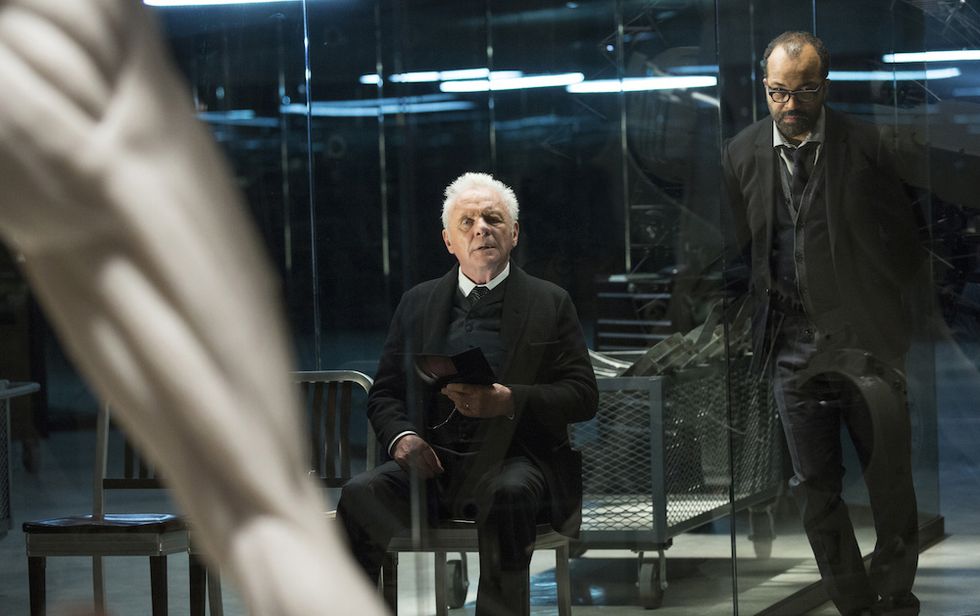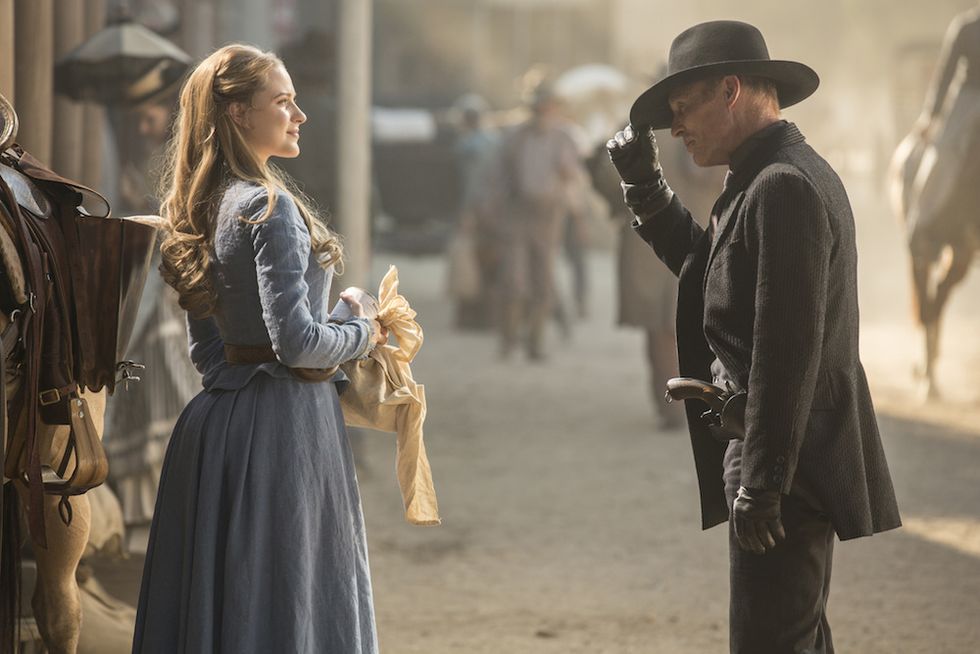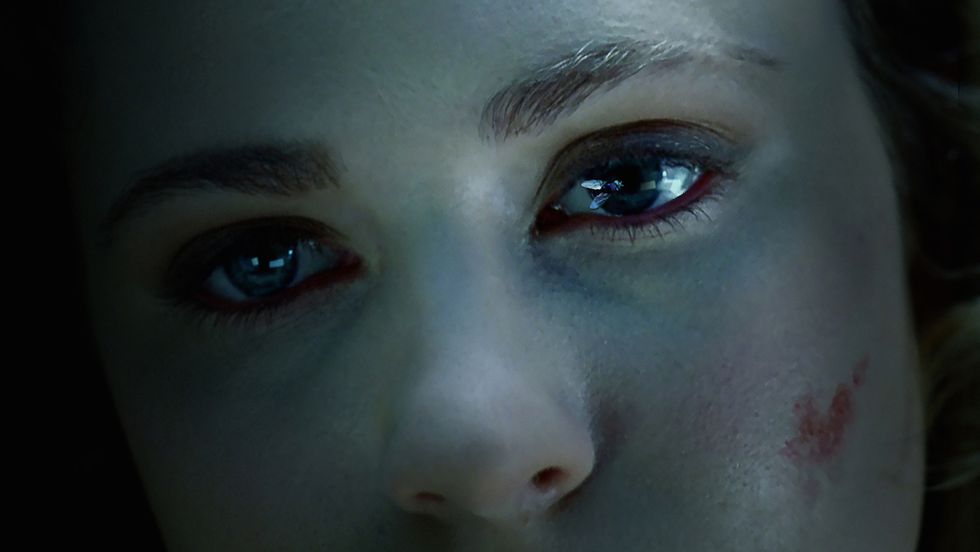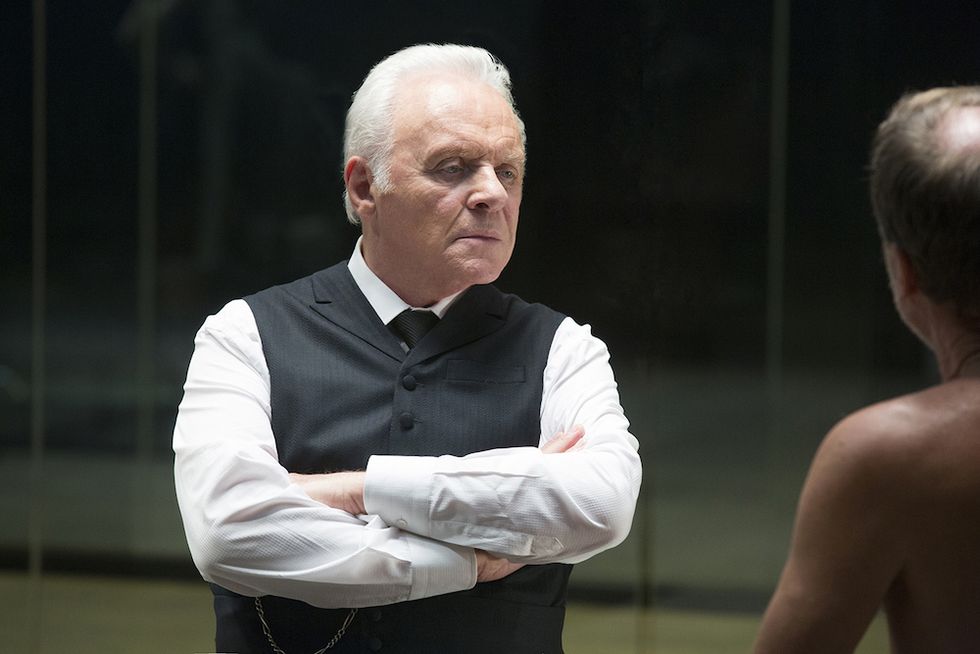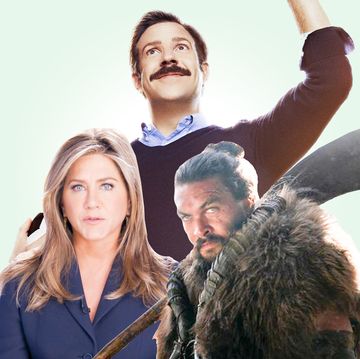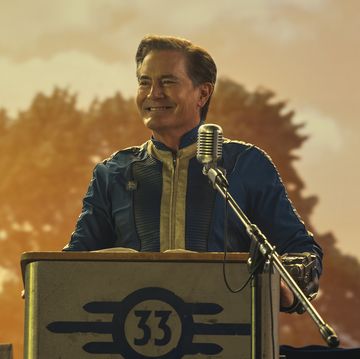A fly landing on an eyeball, the light touch of a finger on a synthetic lip, a naked human form sitting exposed as an object of beauty formed by either god or man—Westworld is a show that explores what it means to be human by confusing our notions of sentient life and artificial intelligence.
一只苍蝇落在眼球上,手指轻触人造嘴唇,裸体的人类形体暴露在外,作为神或人创造的美丽物体—— 《西部世界》是一部通过困惑来探索人类意味着什么的节目。我们对有感知生命和人工智能的概念。
HBO's newest science fiction series takes place in a near future in which wealthy guests vacation in Westworld. The titular setting is an amusement park of cowboys and Indians that immerses patrons into the wild American frontier, where the damsels, sheriffs, heroes, and villains are all near perfect mechanical humans known as "hosts."
HBO 最新的科幻小说系列故事发生在不久的将来,富有的客人在西部世界度假。名义上的场景是一个牛仔和印第安人的游乐园,让顾客沉浸在狂野的美国边境中,那里的少女、警长、英雄和恶棍都是近乎完美的机械人,被称为“主人”。
On its surface, Westworld could easily be interpreted as Jurassic Park with cowboy humanoid robots (which wouldn't be far off, as it's a reimagining of Jurassic Park writer Michael Crichton's 1973 film of the same name). But the show, thanks to the curious sci-fi minds of showrunners Jonathan Nolan and Lisa Joy, manages to address some of the most pressing concerns of our stunningly technological world. All at once, the show takes on masculinity, our notion of reality, the ethics of entertainment and human-machine interaction, the dangers of artificial intelligence, and our very definitions of sentient life. These are demanding topics that television shows rarely ask an audience to wrestle with. Yet Westworld manages to keep sight of what it is: an exploration of humanity along with a study of the western genre that provides a palatable balance of shootouts, campy ragtime covers of Radiohead songs, and gunslinging with a lecture in ethics.
从表面上看, 《西部世界》很容易被解读为配有牛仔人形机器人的侏罗纪公园(这也相差不远,因为它是对侏罗纪公园编剧迈克尔·克莱顿 1973 年同名电影的重新想象)。但得益于制片人乔纳森·诺兰和丽莎·乔伊的好奇科幻头脑,这部剧成功地解决了我们这个令人惊叹的科技世界中一些最紧迫的问题。这部剧一下子呈现出男性气质、我们对现实的看法、娱乐和人机交互的伦理、人工智能的危险,以及我们对有感知生命的定义。这些都是电视节目很少要求观众思考的棘手话题。然而《西部世界》却成功地看到了它的本质:对人性的探索以及对西方流派的研究,在枪战、Radiohead 歌曲的夸张拉格泰姆翻唱、枪战与道德讲座之间提供了一种令人愉快的平衡。
Coming at a time when fans are starved for another Game of Thrones, Westworld is HBO's attempt to fill that void. But the truth is, Westworld is not Game of Thrones. And that's a good thing. Because although the shows are largely matched in terms of production value, Westworld provides the clay and tools for Nolan and Joy to discuss themes far beyond killing our favorite characters.
在粉丝们渴望再看一部《权力的游戏》之际,HBO 试图填补这一空白,推出《西部世界》 。但事实是, 《西部世界》不是《权力的游戏》 。这是一件好事。因为虽然这两部剧在制作价值上基本不相上下,但《西部世界》为诺兰和乔伊提供了讨论主题的土壤和工具,而不仅仅是杀死我们最喜欢的角色。
ESQ: One of the small details that I really liked about the show was when you weren't sure if a character was an actual person or a wax figure. It created that sense of uncertainty in the viewer. What does that add to the experience of watching Westworld?
ESQ:这部剧中我真正喜欢的一个小细节是你不确定一个角色是真人还是蜡像。它给观众带来了一种不确定感。这对观看《西部世界》的体验有何影响?
Nolan: I think we wanted the show to explore the uncanny valley completely. We wanted this idea of near AI (artificial intelligence), or near-human AI. It's an interesting one, because as you approach the question of intelligence and consciousness and sentience, the fabric of that is very subtle. It's the suspense of what makes us alive. Humans are so attuned to tiny behavior in each other, you know? We're so aware of the tiny movements of eyes and hands, the tiny curl of a mouth into a smile. We read so much into behavior. And the sense that a machine could evoke that is something that in the real world we're getting closer and closer to. Not the physicality of it, but our online interactions are becoming more and more sophisticated and harder and harder to tell whether you're dealing with a human or a bot or a piece of software. We were just fascinated by that—the moment in which the robot's behavior becomes so close to human that it's only in the tiny subtle ways that you're exploring the question of, well, are they sentient or not? Because they certainly seem sentient.
诺兰:我认为我们希望这部剧能够彻底探索恐怖谷。我们想要这种近人工智能(near AI)或近人类人工智能(near- human AI)的想法。这是一个有趣的问题,因为当你探讨智力、意识和知觉的问题时,它的结构是非常微妙的。这是让我们活着的悬念。人类对彼此的微小行为非常敏感,你知道吗?我们非常清楚眼睛和手的微小动作,嘴角微微上扬的微笑。我们对行为有很多解读。在现实世界中,我们越来越接近机器能够唤起这种感觉。不是它的物理性,而是我们的在线交互变得越来越复杂,越来越难以判断你是在与人、机器人还是软件打交道。我们只是对此着迷——机器人的行为变得如此接近人类的那一刻,以至于你只是在以微小的微妙方式探索这个问题:它们是否有知觉?因为他们看起来确实是有感情的。
Westworld does such a good job making the viewer empathize with these "hosts," or these machines. What do you think this says about modern technology?
《西部世界》很好地让观众对这些“主机”或这些机器产生了共鸣。您认为这对现代技术意味着什么?
Joy: You know, building that empathetic connection between the audience and the host is something we worked very hard to create, both on the page and in performance. I think the question that we pose in this series—"Have you ever questioned the nature of your reality?"—is applied to the hosts, but if they seemed lifelike and we empathize with them, then it might act as a mirror of us. Then the audience is also asking, "Have you ever questioned the nature of your reality and your place within it?" So, in making them as lifelike as possible, they form a kind of mirror to the guest within the park and also, hopefully, the audience itself.
Joy:你知道,在观众和主持人之间建立移情联系是我们非常努力的目标,无论是在页面上还是在表演中。我认为我们在这个系列中提出的问题——“你有没有质疑过现实的本质?”——适用于主持人,但如果他们看起来栩栩如生并且我们同情他们,那么它可能会成为我们的镜子。然后观众也会问:“你有没有质疑过现实的本质以及你在现实中的位置?”因此,在使它们尽可能逼真的过程中,它们为公园内的游客以及观众本身形成了一面镜子。
Is that why so much of the story is told from the host's point of view?
这就是为什么这么多故事都是从主持人的角度来讲述的吗?
Nolan: Yeah, I mean, I've long been fascinated by artificial intelligence. My last show was about it—the parts of Interstellar that I was most excited to see brought to screen dealt with the interactions between the artificial crew members and real crew members. I'm fascinated by the subject. And there was an opportunity here to dive all the way in so you're not looking at them—you're looking through them. You're with them trying to understand the world that they've been placed in, and the appetites and their interactions with the guest. It's more about AI looking at us and trying to understand us. Which we thought was such a fascinating way into this story.
诺兰:是的,我的意思是,我一直对人工智能着迷。我的上一场演出就是关于这个的—— 《星际穿越》中我最高兴看到的部分是关于人造船员和真实船员之间的互动。我对这个话题很着迷。这里有一个机会让你一路深入下去,这样你就不会看着它们——而是透过它们来观察。你和他们一起试图了解他们所处的世界、他们的胃口以及他们与客人的互动。更多的是人工智能看着我们并试图理解我们。我们认为这是这个故事如此迷人的方式。
How close are we to this being a reality? I mean, it seems pretty plausible the way that you outline it in the show.
Nolan: We did a little bit of research, we talked to some interesting people, and I kept track of the topic for several years for different projects. I think this is a subject that we have seen so much of in film and television that we've become a little immune to it. We've come to regard it solely as the problem of science fiction, but it's actually happening. Setting aside the theme park aspect of it and anthropomorphic robots, AI—the idea that we could have meaningful interactions and substantial relationships with AI—has been such a figment of science fiction for so long that we've stopped imagining that it will become real or how it will become real. I do think that we are getting closer and closer to a moment in which our online interactions are going to become very confusing—I think we are much closer than people imagine to passing the Turing test online. I think most people think we're 40 years out from that, and I think we're probably more like 10 to 15. It's felt like the topic could head some urgency at this point.
Going along with that relationship with technology and empathizing with technology, that's what makes the sexual violence of the show so difficult to take in. How do you respond to people who might be critical of that?
Joy: Well, I think if the implied sexual violence in the show, if it's jarring for people, makes them think and makes them empathize with the machines, then that's part of a conversation that we wanted to start. There are so many video games out there where violence and sexual violence is just something that you play. And here, because you think of them as the "other" because they are just for recreation, it's just a game. Now, in pushing that boundary and making the host more and more lifelike, we start to question: When does it become immoral, whether or not these are actual human creatures, to exercise these violent urges upon them?
In the first four episodes, you get a predominantly male experience in the park. Is that a design of the park in the show? Or are there more female experiences to come? Is that point of view more of a critique on masculinity itself?
Nolan: I think there's a little bit of all of those things in there. When we set off on writing this series, we had intended to make the park feel as well rounded as possible. You see glimpses of it in the early episodes—it is a place people would take their families. Just as resorts cater to singles and they cater to families, the park experience is designed in such a way you can take your kid there and have the ultimate camping trip—sort of an experience of the American West unlike anything you could have in the real world, where you knew your children would be safe, they'd be looked after, and they'd have a great experience.
But, at the same time, the Western as a genre—this show is very much about genre and storytelling and asking some of these questions: Why do we like these genres? Why was almost every movie a western for almost 30 years? Clearly, as a culture, we get invested in genres. And the western genre is an interesting one. It is significantly more of a masculine fantasy. We're looking at that genre to understand what the fantasy represents for people. In Episode Three, we have a female gun slinger who's come as a guest to indulge her fantasy. You imagine the player that caters to everyone's taste. We did settle in on a story line that emphasizes more of a masculine experience, in part because the genre seems to tilt that way.
I thought the music was really fascinating, with the twangy western covers of Radiohead and "Paint it Black." But, to me, it seemed like these modern pop songs were the only hint that this show might be taking place in our timeline. Is that a hint, or was it just using these songs as a cool way to get popular music in there?
Nolan: Yeah, I think that we did want to gently remind the audience that this was possible, that this is not a real western, that this is a synthetic western. The point of view of the show is largely limited to what the hosts understand about their world. And they don't understand much; they don't know what that outside world is, they don't know when that outside world is. They're coming to discover that. But their world has been sort of fabricated and filled with cultural references. Their dialogue features allusions and homage. That music in the saloon. And on a creative level, we just loved the idea of being able to take advantage of popular music but recast it as something that you'd feature in the Old West. And we love the player piano as the symbol for the hosts themselves, but as a symbol for the kind of collision of the Old West and the modern world.
I know that HBO is trying to create Game of Thrones-style shows that are going to catch. Given the success of that show, did that create any sense of pressure for you guys while creating Westworld?
Joy: We're both huge fans of Game of Thrones and the programming that HBO has done over the years. When we were thinking of Westworld and doing it with HBO, what they really showed us is that they have the ambition in their network, and they value production value as much as we did, and that that would be a perfect place to do a show of this scope and this ambition.
Yet you guys don't get bogged down by the technicality, the little details of how this works. I think so much bad sci-fi over-explains. Is it difficult to naturally let the viewer fill in the gaps?
Nolan: That's really the challenge within a lot of ideas in this. And one of the things we're interested in with this series is the ways in which AI won't resemble us, the ways in which their mentality and their thinking will be distinctly different from ours. We're the only species that we're currently familiar with that we deem sentient, right? Apply a different set of standards to all the other animals on this planet and other species of life that were sentient—like Neanderthals, like Ford says in a later episode—you know, we fucked and ate them out of existence. Right? There's nothing left on this planet that we deem intelligent. We're only familiar with the way that humans think.
But I think articulating that—we did a lot of thinking about what that consciousness would look like, the nuances of it, how it would be qualitatively different from human thinking. And the impulse there is to say, "Look! Look at all the thinking we did!" Then you get to a point, usually in the edit sweep, that you think, "Look, the thing that I enjoy most as an audience member is being allowed to put things together and figure them out for myself." We tried to strike a balance between big ideas, big complicated storytelling, but also letting the audience find their own way through the narrative. It's a challenge, but it's a fun one.
I think this show connects so well to our moral choices in a realm where they wouldn't have any real-world consequences. Do you think our modern or current version of Westworld would be how we treat other people online or in video game?
Nolan: That's a great observation.
Joy: It really is. No one's actually pointed that out before, but I think it's really true. We thought about it mostly with gaming, but ... the way in which technology works now is it allows a barrier between people [discussing a subject] and the subject of what's being discussed. And I think that within that you can start to feel an otherness with the person that you're dealing with, and that leads to all sorts of bad behavior.
Nolan: There's this long observed phenomenon that killing in war time is easier the more distant you are from your target. And the more automated we can make killing people, the easier it is for people to do it, right? I mean, that's long been a function of warfare; it's a well-understood phenomenon within that world. We've taken that logic and applied it to our social interactions online. It's no wonder why Twitter becomes a fucking heaping mass of wretchedness. There's a real question Twitter's actively struggling with right now in terms of: How do we prevent this from sliding into being a cesspool in which people behave in ways that they would never behave in person?
It is kind of a fascinating, dehumanizing world that we're stepping ever more rapidly into. But I think all of us are kind of saying, "Wait a fucking second," you know? How do we retain some level of civilization and humanity? How do we hold onto some of that in a world that is becoming ever more confusing when it comes to our interactions with people? We've been able to take on board all of these innovations and adapt very rapidly to them. But you still fundamentally have some human attributes that don't work very well in the world that we've created, you know? Which is part of the reason why new technologies and social media should be wonderful things and are often not, because we're all broken.

